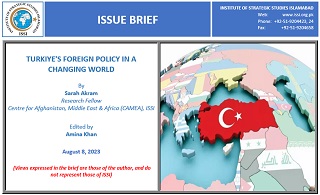In an increasingly interconnected world, Turkiye’s foreign policy outlook plays a crucial role in shaping its position on the global stage. As a country with a rich history and strategic location, Turkiye faces numerous challenges and opportunities in its interactions with the international community. One of the keywords that define Turkiye’s foreign policy approach is ‘balance’. Turkiye seeks to strike a delicate equilibrium between maintaining strong alliances with its traditional partners while also pursuing new partnerships and diversifying its diplomatic engagements. This balanced approach allows Turkiye to safeguard its national interests while promoting peace, stability, and economic prosperity.
Turkiye’s historical approach to foreign relations has been predominantly characterized by a status quo orientation, where its interactions with neighboring states were largely influenced by broader geopolitical struggles. However, with the end of the Cold War and the subsequent augmentation of Turkiye’s economic, military, and diplomatic capabilities, a notable shift has occurred. Turkish foreign policy has now turned its attention towards redefining the regional order to align with its increasing aspirations for enhanced regional role and influence. Moving forward, the manner in which Ankara pursues its objectives and the responses elicited from neighboring countries will play a crucial role in further shaping Turkiye’s foreign relations. With the slogan of ‘zero problems with neighbours,’ to one with substantial interface with regional countries, the country’s foreign policy has evolved in numerous ways. This evolving dynamic in Turkish foreign policy is likely to remain a constant feature, and acquire special significance in this centenary year of Turkish Republic (2023).















